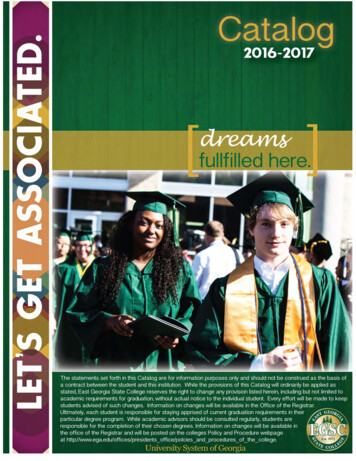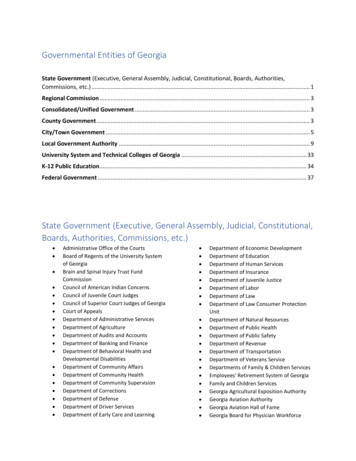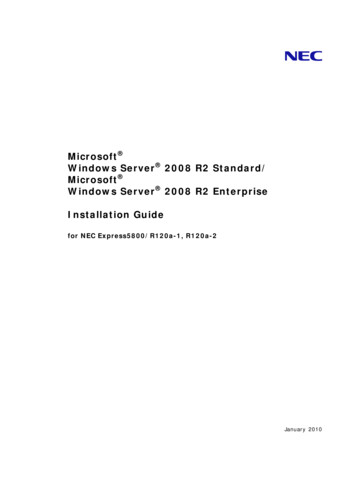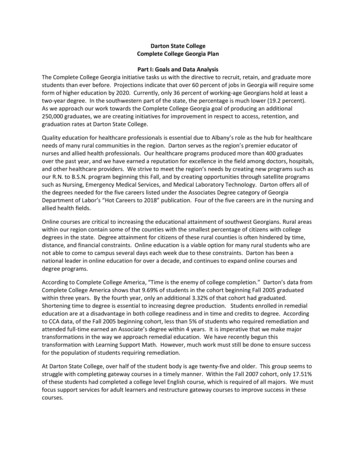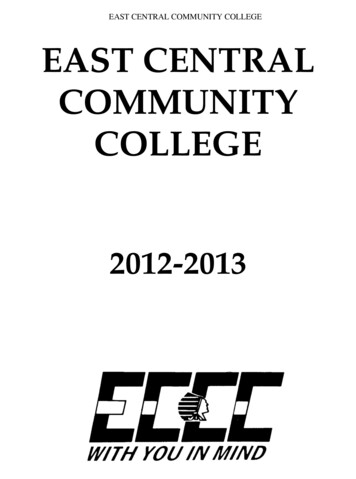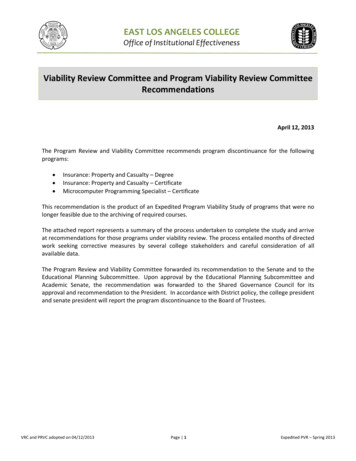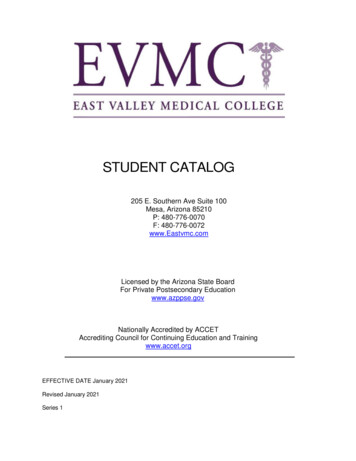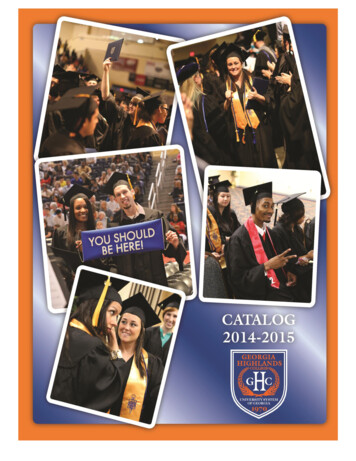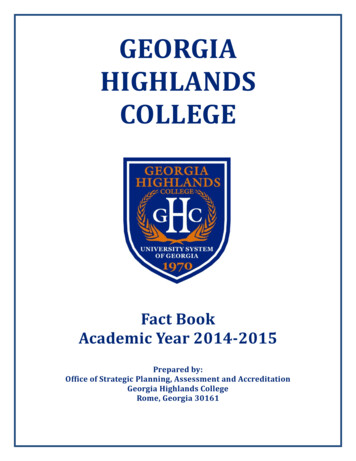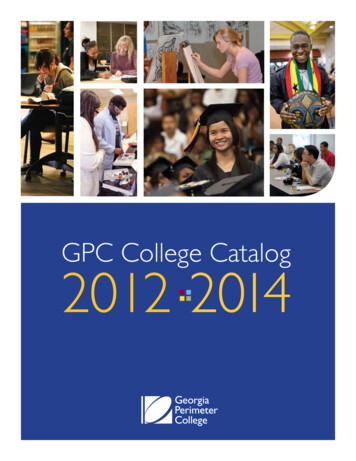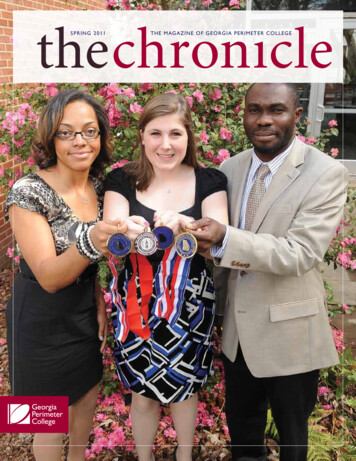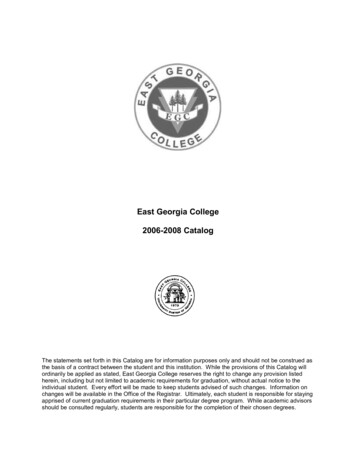
Transcription
East Georgia College2006-2008 CatalogThe statements set forth in this Catalog are for information purposes only and should not be construed asthe basis of a contract between the student and this institution. While the provisions of this Catalog willordinarily be applied as stated, East Georgia College reserves the right to change any provision listedherein, including but not limited to academic requirements for graduation, without actual notice to theindividual student. Every effort will be made to keep students advised of such changes. Information onchanges will be available in the Office of the Registrar. Ultimately, each student is responsible for stayingapprised of current graduation requirements in their particular degree program. While academic advisorsshould be consulted regularly, students are responsible for the completion of their chosen degrees.
2Table of ContentsEast Georgia CollegeTable of ContentsGeneral InformationAdmissionsFinancial AidAcademic Policy and ProcedureTuition and FeesStudent ServicesDegrees and Programs of StudyCourse DescriptionsEast Georgia College PersonnelGlossaryIndexCampus Map37212741445076909496100
East Georgia CollegeGeneral Information3General InformationThe University System of Georgia, 270 Washington Street, S.W., Atlanta, Georgia 30334The University System of Georgia includes all state-operated institutions of higher education in Georgia:4 research universities, 2 regional universities, 13 state universities, and 16 colleges. These 35 publicinstitutions are located throughout the state. A 15-member constitutional Board of Regents governs theUniversity System, which has been in operation since 1932. Appointments of Board Members are madeby the Governor, subject to confirmation by the State Senate. The regular term of Board members isseven years. The Chairman, Vice Chairman, and other officers of the Board are elected by the membersof the Board. The Chancellor, who is not a member of the Board, is the chief executive officer of theBoard and the chief administrative officer of the University System. The overall programs and services ofthe University System are offered through three major components: Instruction, Public Service/ContinuingEducation, and Research.Instruction consists of programs of study leading to degrees, ranging from the associate (two-year) levelto the doctoral level. Requirements for admission of students to instructional programs at each institutionare determined, pursuant to policies of the Board of Regents, by the institution. The Board establishesminimum academic standards and leaves to each institution the prerogative to establish higher standards.Applications for admission should be addressed in all cases to the institutions.Public Service/Lifelong Education consists of non-degree activities, primarily, and special types ofcollege degree credit courses. The non-degree activities are of several types, including short courses,seminars, conferences, lectures, and consultative and advisory services, in a large number of areas ofinterest. Typical college degree credit public service/lifelong education courses are those offered throughextension center programs and teacher education consortiums.Research encompasses investigations conducted primarily for discovery and application of knowledge.These investigations cover matters related to the educational objectives of the institutions and to generalsocietal needs. Most of the research is conducted through the universities; however, some of it isconducted through several of the senior universities. The policies of the Board of Regents provideautonomy of high degree for each institution. The executive head of each institution is the President,whose election is recommended by the Chancellor and approved by the Board. State appropriations forthe University System are requested by, made to, and allocated by the Board of Regents. The largestshare of the state appropriations - approximately 52 percent - is allocated by the Board for Instruction.Mission StatementEast Georgia College, as a two-year liberal arts unit of the University System of Georgia, serves as apoint of access to higher education. The college also engages in public service, continuing education,technical assistance, and economic development activities that address the cultural and economic needs,improve the quality of life, and raise the educational level of residents within the college’s rural, eastcentral Georgia service region.East Georgia College is committed to a positive and growing impact on its community - an impactthat will:- demystify the college experience among those for whom higher education has not been a partof their experience;- increase college participation among those who otherwise would not have the opportunity;- foster increased intellectual aspiration and attainment among all.In addition, the College enthusiastically meets the needs of a developing economy through its fourteencounty region. In these endeavors, the College seeks to sustain and enhance its tradition of excellence.East Georgia College shares with other institutions in the University System of Georgia thefollowing characteristics:
4General InformationEast Georgia College- a supportive campus climate, necessary services, and leadership and developmentopportunities, all to educate the whole person and meet the needs of students, faculty,and staff;- cultural, ethnic, racial, and gender diversity in the faculty, staff, and student body, supported bypractices and programs that embody the ideals of an open, democratic, and globalsociety;- technology to advance education purposes, including instructional technology, student supportservices, and distance education;- collaborative relationships with other system institutions, state agencies, local schools,technical colleges, business and industry, sharing physical, human, information, andother resources to expand and enhance programs and services available to the citizensof Georgia.East Georgia College shares with other two-year colleges in the University System the followingcharacteristics:- commitment to excellence and responsiveness within a scope of influence defined by the needsof a local area and by particularly outstanding programs or distinctive characteristics thathave a magnet effect throughout the region or state;- commitment to a teaching/learning environment, both inside and outside the classroom thatsustains instructional excellence, functions to provide University System access for adiverse student body, and promotes high levels of student learning;- high quality general education program that supports a variety of well-chosen associateprograms and prepares students for transfer to baccalaureate programs, learning supportprograms designed to insure access and opportunity for a diverse student body, andprograms to complement neighboring technical college programs;- commitment to public services, continuing education, technical assistance, and economicdevelopment activities that address the needs, improve the quality of life, and raise theeducational level within the college's scope of influence;- commitment to scholarship and creative work to enhance instructional effectiveness and meetlocal needs.East Georgia College is known for its strong academic standards, its dedicated and skillful faculty, and itscommitment to quality improvement through a college-wide comprehensive assessment process. We areproud of our role as a learning resource for the people of rural east-central Georgia and seek to buildupon our strength to justify recognition as one of the most student-oriented, community-centered, andacademically respected institutions of its kind.AccreditationEast Georgia College is accredited by the Commission on Colleges of the Southern Association ofColleges and Schools (1866 Southern Lane, Decatur, Georgia 30033-4097: Telephone number 404-6794501) to award the Associate in Arts and the Associate in Applied Science degrees.Memberships and AffiliationsAmerican Association of Community and Junior CollegesAmerican Library AssociationAssociation of Departments of EnglishGeorgia Association of Chiefs of PoliceGeorgia Association of College StoresGeorgia Association of CollegesGeorgia Association of Collegiate Registrars and Admissions OfficersGeorgia Association of Physical Plant AdministratorsGeorgia Association of Student Financial Aid AdministratorsGeorgia Honors CouncilNational Association of Student Financial Aid AdministratorsNational Association of College and University Business Officers
East Georgia CollegeGeneral Information5South Atlantic Association of Departments of EnglishSouthern Association of Collegiate Registrars and Admissions OfficersSouthern Association of Student Financial Aid AdministratorsThe CampusEast Georgia College blends the modern buildings of the campus into a beautiful pastoral setting thatincludes a small lake. Much of the land was a gift from Mrs. David Gambrell, a native of Swainsboro.The college campus consists of seven buildings, recently enhanced with the addition of a new PhysicalEducation Annex consisting of additional classroom space and a gymnasium, and provides facilities for700 students. The campus consists of an academic resource center, administration building, studentcenter, academic building, physical education building, ceramic art studio, and warehouse-maintenancebuilding. Included in the academic building are eight general classrooms, two large lecture halls and fourlaboratories designed for biology, chemistry, physics, and geology. The laboratories are supported by acompletely networked computer lab dedicated to Science and Mathematics. The Luck Flanders GambrellCenter contains classrooms, a computer lab, GSAMS room, auditorium, stage, library, and office space.The Student Center, the hub of East Georgia College student activity, contains a dining area, kitchen andgrill, student government and publications rooms, bookstore, student lounge, game room, guidancecenter, and general purpose meeting rooms. A new Student Services Complex is currently underconstruction, and should be completed by the Fall 2007 term. Adjacent to the physical education buildingis an area devoted to outdoor athletic facilities, including a football-soccer field, tennis courts, softballdiamond, a recently added ‘ropes’ course adjacent to the walking trail area, and general use areas.Parking areas to accommodate approximately 1,000 automobiles are also provided.The LibraryThe library is located in the heart of the new Luck Flanders Gambrell Center and serves as the focal pointfor the college's learning experience. The facility provides an aesthetically pleasing, open atmosphere forstudy and relaxation. The library's book collection totals more that 42,000 volumes. Subscriptions aremaintained to approximately 130 periodicals, both popular and scholarly. Periodical back-files areavailable in bound volumes and on microfilm. The library also subscribes to more than fifteennewspapers, including local, regional, and national titles. The library has an extensive collection of nonprint material including video and cassette tapes, microfilm, microfiche, films, and slides. The libraryhouses a photocopy machine and reader-printer for microform copies. The library’s collection ofperiodicals is supplemented by GALILEO, an electronic, computer-based statewide library system whichis accessed on the Internet through PeachNet, Georgia’s educational computer network. GALILEOprovides access to almost 200 databases, many of which are full text. The OPAC (On-line Public AccessCatalog) provides access to the library’s book and video collection and is available through GALILEO.Within the library is The Heritage Center which houses a special collection of materials on EmanuelCounty history and histories of surrounding counties. The Heritage Center contains census records, aphotograph collection, numerous folders of miscellaneous documents and back-files of The Blade, theSwainsboro and Emanuel County newspaper. The library is open six days, including nights and selectedSundays while classes are in session. Library staff and student assistants are available to assist studentsand community patrons.Collaborative AgreementsThe East Georgia College Center at Statesboro is an innovative model for the delivery of learning supportand general education courses to students who, because of rising University System admissionstandards, are denied admission to Georgia Southern University. The Center specializes in small classesand enhanced opportunities of one-on-one student-faculty interaction.A cooperative nursing program is in place between East Georgia College and Darton College in whichEGC provides the general education component of the program and Darton provides the nursingcomponent for awarding an Associates degree in nursing. Students must meet eligibility requirements inorder to be accepted into the Darton College school of nursing; final entrance into the program iscompetitive. Graduates are allowed to take the National Council of Licensure Examination (NCLEX-RN)for qualification as a registered nurse. All courses, general education and nursing, are available inSwainsboro.
6General InformationEast Georgia CollegeEast Georgia College also offers courses at the Heart of Georgia Technical College (Dublin), OgeecheeTechnical College (Statesboro), Sandersville Regional Technical College (Sandersville), SoutheasternTechnical College (Vidalia), and Swainsboro Technical College (Swainsboro) as a part of a cooperativeAssociate in Applied Science degree program.Lifelong EducationEast Georgia College is dedicated to serving the entire community through its educational programs. TheLifelong Education Department offers a broad range of both credit and non-credit courses in the form ofworkshops, conferences, seminars, in-service training, lectures, discussion groups, and other specializedendeavors. Participation in continuing education courses is open to anyone. Continuing Education Units(CEU's) are awarded to persons who successfully complete specific types of courses. The LifelongEducation Office also provides contract training upon request from business and/or community agencies.Activities of the Office of Lifelong Education are designed to appeal to the professional, cultural, andrecreational interests of the citizens of the community. The Office of Lifelong Education invitessuggestions for programs from individuals, business and industrial firms, public officials, and otherorganizations. Anyone interested in continuing education programs should contact the Director of LifelongEducation or the Office of Public Information at the College.East Georgia College FoundationThe primary purpose of the East Georgia College Foundation is to promote higher education in the areathrough development of the local college. The Foundation is empowered to create scholarships and/orendowments and to furnish grants for research or scholarly work in arts, science, education or other fieldsin which East Georgia College has an interest. Established in 1975, the Foundation is governed by aBoard of Trustees whose officers are: Mr. Ray Woods, Chair; Mr. Jesse Stone, Vice Chair; Mrs. HarrietRay, Secretary; Mrs. Adriance Galloway, Treasurer; Dr. John Black, Executive Director; and Mr. JerryCadle, Past Chair. Other members of the Board are: Mrs. Marcile Bird; Dr. Jean Bridges; Mr. CraigBuckley; Mr. Jeb Cameron; Dr. Anthony Davis; Mr. Bill Devane; Dr. Madison F. Dixon; Mr. DicksonDurden; Mr. Bill Easterlin; Mrs. Stephanie Flanders; Mr. Brian Frederick; Mr. Henry Gambrell; Mr. MiltonGray, Jr.; Mrs. Caroline Harless; Mr. Nick Herrington; Mr. Donald Jenkins; Mr. Phillip Jennings, III; Mrs.Paula Karrh; Mr. Denny Key; Mr. Richard McNeely; Mrs. Jean Morgan; Mr. Harry Moses; Mr. JohnNeighbors; Mr. Larry J. Butch'' Parrish; Mrs. Mabel Y. Poole; Mr. Bobby Reeves; Mr. Bill Rogers, Jr.; Mr.Bill Rountree; Mrs. Peggy Sammons; Dr. Bobby Sasser; Mr. Bill Simmons; Mrs. Margaret Smith; Mrs.Jean Strange; Mrs. Tammy Wilkes; Mr. James White, Jr.; Mr. Donny Wilson; and Mrs. Carol Yeomans.The Mary, Mattie, and Annie Lee Warren Memorial Education FundThe Mary, Mattie, and Annie Lee Warren Memorial Education Foundation Fund was established by thelate Dr. Earl Loy Warren and Mrs. Warren, at the suggestion of Mr. Ben Ehrlich, for the culturaladvancement, enjoyment and enlightenment of the students and faculty of East Georgia College andcitizens of Emanuel County and surrounding areas. The fund annually provides revenue to sponsor orsubsidize seminars in such areas as health and medicine, law, journalism, commerce, music, andreligion; lectures by eminent authorities on subjects taught at the College; and cultural programs in art,music, drama and dance.Lay Advisory CommitteesContinuing Education and Public Service programs at the College are assisted by the establishment of aLay Advisory Committee whose function is to provide information, guidance, and liaison with theprofessional and personal life of the community. Through consultation, advice, and support, the LayAdvisory Committee for Continuing Education may extend a genuine service to the College and thecommunity.
East Georgia CollegeAdmissions7AdmissionsThe Office of Admissions is located in the George L. Smith II Building and can be contacted by telephoneat (478) 289-2017, by mail at East Georgia College, Admissions Office, 131 College Circle, Swainsboro,Georgia 30401-2699 or via our website @ www.ega.edu.General Admissions InformationApplications and all required documents should be returned to the college five days prior to theregistration date for the semester in which the student wishes to enroll. Applicants are encouraged toapply or update their applications well in advance of the deadline. Late applications may be considered atthe discretion of the Director of Enrollment Services. All applicants will be assessed a 20 non-refundableapplication fee.The College has the right to cancel admission prior to or following enrollment if the applicant becomesineligible as determined by the standards of the Board of Regents for the University System of Georgia.Final acceptance or denial of each applicant is determined by the Director of Enrollment Services. Thisdecision may be appealed by the applicant under provisions set by the College and the Board of Regentsof the University System of Georgia. Applicants will be notified of the status of their admission when allcredentials have been received and the review process is completed.Applicants have a responsibility to inform the college if they have been convicted of certain crimes.These convictions shall include: a finding of guilty by a judge or jury, or a plea of nolo contendre,irrespective of the pendency or availability of any appeal or application for collateral relief. If thestudent has been convicted of one or more of the above-mentioned crimes, he/she should explain thesituation fully upon applying for admission, specifying the nature of the offense(s), the date(s) it/theyoccurred, the name and location of the court(s) and sentence(s) imposed. Please submit courtdocumentation if appropriate. These circumstances could be grounds for cancellation of admission.Students seeking careers and/or professional licensure in certain fields, including—but not limited to—nursing, education, criminal justice, social work, psychology, law, or medicine, may be required to submita future background check prior to a clinical assignment, internship, and/or professional licensure. It is thestudent's responsibility to check the requirements of his or her program of study and professionallicensing board. Successful completion of a program of study in any of the above fields at any UniversitySystem of Georgia institution does not guarantee licensure or employment in that respective profession.An application is valid for the semester for which it is submitted. The recor
A cooperative nursing program is in place between East Georgia College and Darton College in which EGC provides the general education component of the program and Darton provides the nursing component for awarding an Associates degree in nursing
